family
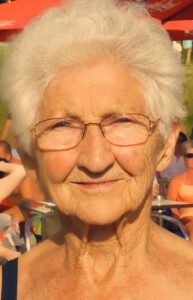 For most of us, who took gymnastics in school or other training, our school years coming to an end, usually also ends our “gymnastics career,” if it could be called that. There are some gymnasts who continue on in their career or even go on to the Olympics, but even then, most of them are finished with their gymnastics career by their late teens or early twenties. Let’s face it, gymnastics is a strenuous career, and most people just can’t take the strain very late in life or even past their very early lives. There are a few, however, who are active into their mid to late thirties, and one, Oksana Chusovitina, who is currently still active at 48 years old. Nevertheless, Chusovitina is nowhere near the oldest active gymnast.
For most of us, who took gymnastics in school or other training, our school years coming to an end, usually also ends our “gymnastics career,” if it could be called that. There are some gymnasts who continue on in their career or even go on to the Olympics, but even then, most of them are finished with their gymnastics career by their late teens or early twenties. Let’s face it, gymnastics is a strenuous career, and most people just can’t take the strain very late in life or even past their very early lives. There are a few, however, who are active into their mid to late thirties, and one, Oksana Chusovitina, who is currently still active at 48 years old. Nevertheless, Chusovitina is nowhere near the oldest active gymnast.
Johanna Quaas, who is finally “rumored” to have retired, was born November 25, 1925. She is a German gymnast who was certified by Guinness World Records April 12, 2012, as the world’s oldest active competitive gymnast. At that time, she was 86 when she broke the record. She was a regular competitor in the amateur competition Landes-Seniorenspiele (State Senior Games) in Saxony. She became known worldwide on March 26, 2012, when YouTube user LieveDaffy uploaded two videos of Quaas performing gymnastics routines…one on the parallel bars and one on the floor. Prior to that video, the tiny, 5’2″ gymnast was relatively unknown, but as the clips went viral, within six days of posting and had generated over 1.1 million views each, that all changed. In addition to being recognized by Guinness World Records, Quaas has received the Nadia Com?neci Sportsmanship Award from the International Gymnastics Hall of Fame. Being an active gymnast at 86 is unheard of, and yet, Quaas continued to compete until she suffered a torn biceps tendon in 2018, while trying to help her granddaughter. Of the incident, “She just wanted to adjust a baby chair 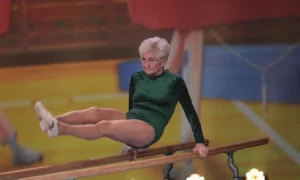 for her granddaughter, but the ‘nipple just wouldn’t go through the flap’ – a jerk and jerk – a severe pain in her left arm led to the above diagnosis! That hurt, of course,” said the still active senior athlete, “but strangely enough, I can now raise my arm a lot better than before, and the doctor said, let’s leave it that way for now!” Technically, she stopped performing active or competitive gymnastics. Nevertheless, in addition to fact that she can actually raise her arm better than before, she could still stand on her head at age 95. Still unable to slow down really, she has developed a bed gymnastics routine which she performs every morning and has made the routine available on YouTube and DVD published by Wissner-Bosserhoff. So, has she completely retired? Only time will tell.
for her granddaughter, but the ‘nipple just wouldn’t go through the flap’ – a jerk and jerk – a severe pain in her left arm led to the above diagnosis! That hurt, of course,” said the still active senior athlete, “but strangely enough, I can now raise my arm a lot better than before, and the doctor said, let’s leave it that way for now!” Technically, she stopped performing active or competitive gymnastics. Nevertheless, in addition to fact that she can actually raise her arm better than before, she could still stand on her head at age 95. Still unable to slow down really, she has developed a bed gymnastics routine which she performs every morning and has made the routine available on YouTube and DVD published by Wissner-Bosserhoff. So, has she completely retired? Only time will tell.
Johanna Geißler was born November 20, 1925, in Hohenmölsen, Germany. She was always an active child. She often climbed tall bars and roll on the mats. She began gymnastics at an early age and loved it immediately. She first competed at about age ten, but soon her family moved to a different part of Germany, temporarily ending her participation in competitions. When she was eleven, she began Nazi Germany’s required social 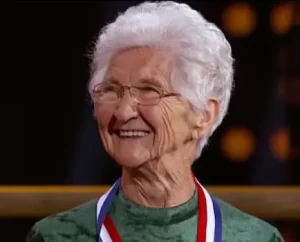 service work for girls during World War II during which she worked in farming and took care of the children of another family. After completing the compulsory social service, she trained as a gymnastics coach in Stuttgart, finishing in 1945 and moving to Weißenfels. She was still unable to work in gymnastics at that time, because it had been banned in East Germany during the first two years of post-World War II Allied occupation. So, she took up team handball instead, while in Weißenfels, learning and practicing it until the ban on gymnastics was removed in 1947. In 1950, she studied at the University of Halle to become a sports teacher. She has been an active athlete all her life, and it’s been a very long and healthy life. Today, Johanna Quaas is 98 years old. Happy birthday to this amazing lady.
service work for girls during World War II during which she worked in farming and took care of the children of another family. After completing the compulsory social service, she trained as a gymnastics coach in Stuttgart, finishing in 1945 and moving to Weißenfels. She was still unable to work in gymnastics at that time, because it had been banned in East Germany during the first two years of post-World War II Allied occupation. So, she took up team handball instead, while in Weißenfels, learning and practicing it until the ban on gymnastics was removed in 1947. In 1950, she studied at the University of Halle to become a sports teacher. She has been an active athlete all her life, and it’s been a very long and healthy life. Today, Johanna Quaas is 98 years old. Happy birthday to this amazing lady.
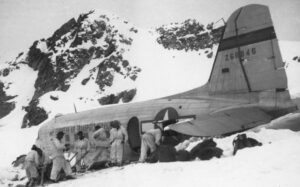
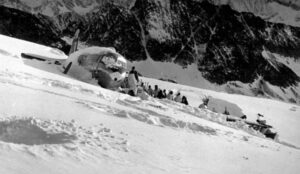 When Switzerland found itself in the middle of an unusual heatwave, the Gauli Glacier melted enough to uncover the wreckage debris of an American World War II plane that crash-landed in the Bernese Alps 72 years ago. Now, when you hear about the crash of a plane, especially into a mountain or in this case, a glacier, you expect to find fatalities. Of course, this plane crashed a long time ago, and the authorities already knew the outcome of that crash. The people who found the plane in the ice, however, might not have. This plane, a C-53 Skytrooper Dakota had been traveling from Austria to Italy when it collided with the Gauli Glacier at an altitude of 10,990 feet on that fateful day.
When Switzerland found itself in the middle of an unusual heatwave, the Gauli Glacier melted enough to uncover the wreckage debris of an American World War II plane that crash-landed in the Bernese Alps 72 years ago. Now, when you hear about the crash of a plane, especially into a mountain or in this case, a glacier, you expect to find fatalities. Of course, this plane crashed a long time ago, and the authorities already knew the outcome of that crash. The people who found the plane in the ice, however, might not have. This plane, a C-53 Skytrooper Dakota had been traveling from Austria to Italy when it collided with the Gauli Glacier at an altitude of 10,990 feet on that fateful day.
It was November 19, 1946, and the plane carrying four crew members and eight passengers were enjoying their trip, when something went terribly wrong. When they hit the glacier, several people were injured, amazingly, there were no fatalities. Among the passengers were high-ranking United States service members traveling with relatives…four women and one 11-year-old girl. Now, they found themselves high up on a glacier, and it was likely very cold. They were stuck at the crash site for six days before rescuers found them and could 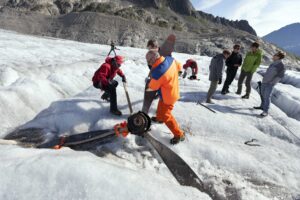
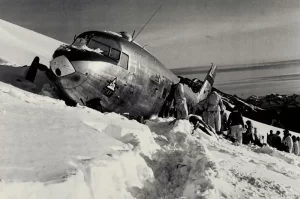 get to them. They were forced to drink snow water and ration chocolate bars to survive, but survive they did. Many times, survival at a crash site, if you survived the initial crash, is all about using common sense and keeping your wits about you. You have to take stock of your supplies and be willing to ration what you have. You can’t let anyone get out of control, because a panic could waste vital supplies. Water is the most vital of the supplies, because while the human body can go weeks without food, it can only live a few days without water. While it would seem that water on a glacier would be plentiful, it may not be so. You would have to chip away at the ice, and then melt it to drink. In addition, you have to get it warm, or you will risk the water causing Hypothermia. This particular group managed to do things right, or at least enough right to survive the six days while they waited for rescue. Once rescued, they went on with their lives feeling very blessed to be alive.
get to them. They were forced to drink snow water and ration chocolate bars to survive, but survive they did. Many times, survival at a crash site, if you survived the initial crash, is all about using common sense and keeping your wits about you. You have to take stock of your supplies and be willing to ration what you have. You can’t let anyone get out of control, because a panic could waste vital supplies. Water is the most vital of the supplies, because while the human body can go weeks without food, it can only live a few days without water. While it would seem that water on a glacier would be plentiful, it may not be so. You would have to chip away at the ice, and then melt it to drink. In addition, you have to get it warm, or you will risk the water causing Hypothermia. This particular group managed to do things right, or at least enough right to survive the six days while they waited for rescue. Once rescued, they went on with their lives feeling very blessed to be alive.
The snow, and later, ice covered the plane as the years went by, and it was very likely forgotten…until 2012 anyway, when three young people discovered the plane’s propeller on the glacier. They continued to observe the emerging plane and as the glacier continued to melt, the scene unfolded. Today, it reportedly looks like a 
 field covered in plane debris, and many people probably wonder how anyone managed to live through the initial crash…much less everyone. As the glacier melted, the plane slid down the mountainside and was expected to finally emerge at the bottom. In fact, much of the debris field might actually be caused by the melting ice.
field covered in plane debris, and many people probably wonder how anyone managed to live through the initial crash…much less everyone. As the glacier melted, the plane slid down the mountainside and was expected to finally emerge at the bottom. In fact, much of the debris field might actually be caused by the melting ice.

 Sometimes, traditions get out of hand, and have to be called off. Such was the case with the Texas A&M University’s annual bonfire. Bonfires have long been associated with high school and college football games, usually for homecoming or the school’s main rival. The bonfire at Texas A&M was a student-built project, that became more and more elaborate every year. The bonfire being built on November 18, 1999, was probably the most elaborate and tallest bonfire structure ever. The 1999 bonfire was supposed to require more than 7,000 logs and was the labor of up to 70 workers at a time. The students had worked all night, and at approximately 2:42am, with a number of students on top of the structure, which at 59 feet high, was actually 4 feet taller than was authorized, the structure collapsed. According to Jenny Callaway, a student survivor working near the top of the stack, “It just snapped.” They had no warning. There was no audible sound, or if there was, it could not be heard over all the chatter. Dozens of students became caught in the huge log pile. Other students, such a Caleb Hill, were relatively unhurt in their 50-foot fall. At the time of the collapse, approximately 5,000 of the planned 7,000 logs were in place. Emergency medical technicians and trained first responders of the Texas A&M Emergency Care Team (TAMECT) rushed to the scene. A student-run volunteer service, who staffed each stage of construction, also began administering first aid to the victims who were thrown clear. TAMECT also alerted the University Police and University EMS, who dispatched all remaining university medics, and requested mutual aid from surrounding agencies. In addition to the mutual aid received from the College Station and Bryan, Texas EMS, Fire, and Police Departments, the members of Texas Task Force 1, the state’s elite emergency response team, were also dispatched to assist the rescue efforts.
Sometimes, traditions get out of hand, and have to be called off. Such was the case with the Texas A&M University’s annual bonfire. Bonfires have long been associated with high school and college football games, usually for homecoming or the school’s main rival. The bonfire at Texas A&M was a student-built project, that became more and more elaborate every year. The bonfire being built on November 18, 1999, was probably the most elaborate and tallest bonfire structure ever. The 1999 bonfire was supposed to require more than 7,000 logs and was the labor of up to 70 workers at a time. The students had worked all night, and at approximately 2:42am, with a number of students on top of the structure, which at 59 feet high, was actually 4 feet taller than was authorized, the structure collapsed. According to Jenny Callaway, a student survivor working near the top of the stack, “It just snapped.” They had no warning. There was no audible sound, or if there was, it could not be heard over all the chatter. Dozens of students became caught in the huge log pile. Other students, such a Caleb Hill, were relatively unhurt in their 50-foot fall. At the time of the collapse, approximately 5,000 of the planned 7,000 logs were in place. Emergency medical technicians and trained first responders of the Texas A&M Emergency Care Team (TAMECT) rushed to the scene. A student-run volunteer service, who staffed each stage of construction, also began administering first aid to the victims who were thrown clear. TAMECT also alerted the University Police and University EMS, who dispatched all remaining university medics, and requested mutual aid from surrounding agencies. In addition to the mutual aid received from the College Station and Bryan, Texas EMS, Fire, and Police Departments, the members of Texas Task Force 1, the state’s elite emergency response team, were also dispatched to assist the rescue efforts.
As with any disaster, word of the collapse spread among students and the community within minutes. By the time the sun rose, the accident was the subject of news reports around the world, and within hours, 50 news satellite trucks were broadcasting from the Texas A&M campus. Because of the precariousness of the structure, the rescue efforts took over 24 hours to complete. The process was slow, because they didn’t want to risk hurting anyone else, or further injuring the students still trapped inside. Students, including the entire Texas A&M football team and many members of the university’s Corps of Cadets, rushed to the site to assist rescue workers with the manual removal of the logs. To further complicate the rescue efforts, they had to call in the Texas A&M civil engineering department to examine the site and help the workers determine the order in which the logs could be safely removed. Also, at the request of the Texas Forest Service, Steely Lumber Company in Huntsville, Texas, sent log-moving equipment and operators to make removal safer for all concerned. At the time of the accident, there were 58 people, students and former students, working on the stack. Of those 58 people, 12 were killed and 27 were injured. Killed in the initial collapse were ten students and one former student. Another student died in the hospital the next day. The last person pulled out alive was John Comstock, who spent months in the hospital following amputation of his left leg and partial paralysis of his right side. He returned to A&M in 2001 to finish his degree.
In the aftermath of the tragedy, “the university gave the National Forestry Hero Award to an employee of Steely Lumber Company, James Gibson, for rescuing students. By 2000 Texas A&M spent over $80,000 so students and administrators could travel to the funerals of the deceased, including $40,000 so 125 students and staff could attend a funeral in Turlock, California by way of private aircraft; most of the persons on board were students. The total amount of funds spent by the university on all disaster-related expenses by that date was $292,000.” For two years, the university tried to decide on a possible way to reinstate the tradition. A task force was formed, and they proposed a new design. The task force recommended that students be allowed to participate in building the bonfire as long as they were monitored by professional construction experts. That plan wasn’t exactly received with open arms by the students. They felt like it would no longer be a student 
 project. In the end, it didn’t matter, because the cost of a liability policy to cover these events would cost more than $2 million per year. With that in mind, the bonfires were discontinued in 2002. Bowen’s successor Robert Gates upheld this decision. In recent years, some students have held smaller bonfires off campus, but the school is not involved with these. Multiple memorials were held to remember the victims of the disaster.
project. In the end, it didn’t matter, because the cost of a liability policy to cover these events would cost more than $2 million per year. With that in mind, the bonfires were discontinued in 2002. Bowen’s successor Robert Gates upheld this decision. In recent years, some students have held smaller bonfires off campus, but the school is not involved with these. Multiple memorials were held to remember the victims of the disaster.
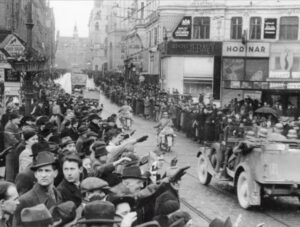 Normally, when you think of something like International Students’ Day, most of us think of a day of things like walkouts, protests, and other days during which students are expected to conform to a collective norm of all these issues, like climate change, anti-war protests, and such. No matter what your stance on that is, this is not why International Students’ Day is commemorated. On November 17, 1939, in Czechoslovakia, students the University of Prague were demonstrating against the German occupation of Czechoslovakia. The Nazi occupation was protested by many groups, and yet, what was a legal protest, was turned into a mass invasion and murder of the student protesters. The event was similar to the Tiananmen Square massacre in which they opened fire on the protesters in China. That one was the Chinese government, while this one was the Nazis. I’s sure the Tiananmen Square massacre was illegal in China, but that was not the case…supposedly anyway, with the Czech protests. Today, the nations have come together in remembering the nine students who were killed, and the others who were sent to concentration camps as a result of their participation in protests over German occupation.
Normally, when you think of something like International Students’ Day, most of us think of a day of things like walkouts, protests, and other days during which students are expected to conform to a collective norm of all these issues, like climate change, anti-war protests, and such. No matter what your stance on that is, this is not why International Students’ Day is commemorated. On November 17, 1939, in Czechoslovakia, students the University of Prague were demonstrating against the German occupation of Czechoslovakia. The Nazi occupation was protested by many groups, and yet, what was a legal protest, was turned into a mass invasion and murder of the student protesters. The event was similar to the Tiananmen Square massacre in which they opened fire on the protesters in China. That one was the Chinese government, while this one was the Nazis. I’s sure the Tiananmen Square massacre was illegal in China, but that was not the case…supposedly anyway, with the Czech protests. Today, the nations have come together in remembering the nine students who were killed, and the others who were sent to concentration camps as a result of their participation in protests over German occupation.
The world was so shocked by the killings and the taking of captives, but not much could be done. Among the dead were Jan Opletal and worker Václav Sedlácek. The Nazis rounded up the students, murdered nine student leaders and sent over 1,200 students to concentration camps, mainly to Sachsenhausen. As a result of the attacks, all Czech universities and colleges were closed. Technically, by this time Czechoslovakia no longer  existed, as it had been divided into the Protectorate of Bohemia and Moravia and the Slovak Republic under a fascist puppet government. The Nazi authorities were in the Protectorate of Bohemia and Moravia. Their main target was students of the Medical Faculty of Charles University. That demonstration was held on October 28, and it was to commemorate the anniversary of the independence of the Czechoslovak Republic in 1918. During this demonstration the student Jan Opletal was shot, and later died from his injuries on November 11th. On November 15th, his body was supposed to be transported from Prague to his home in Moravia. The funeral procession attracted thousands of students, who turned the event into an anti-Nazi demonstration. The Nazis would not allow such a demonstration, so the Nazi authorities took drastic measures in response. They closed all Czech higher education institutions, and arrested the more than 1,200 students, all of whom were then sent to concentration camps. They also executed nine students and professors without trial on November 17th. Historians speculate that the Nazis granted permission for the funeral procession already expecting a violent outcome. Their plan was to use that as a pretext for closing down universities and purging anti-fascist dissidents. I would have to agree. In that way, it was easier to place blame on the students and staff, and not the Nazis.
existed, as it had been divided into the Protectorate of Bohemia and Moravia and the Slovak Republic under a fascist puppet government. The Nazi authorities were in the Protectorate of Bohemia and Moravia. Their main target was students of the Medical Faculty of Charles University. That demonstration was held on October 28, and it was to commemorate the anniversary of the independence of the Czechoslovak Republic in 1918. During this demonstration the student Jan Opletal was shot, and later died from his injuries on November 11th. On November 15th, his body was supposed to be transported from Prague to his home in Moravia. The funeral procession attracted thousands of students, who turned the event into an anti-Nazi demonstration. The Nazis would not allow such a demonstration, so the Nazi authorities took drastic measures in response. They closed all Czech higher education institutions, and arrested the more than 1,200 students, all of whom were then sent to concentration camps. They also executed nine students and professors without trial on November 17th. Historians speculate that the Nazis granted permission for the funeral procession already expecting a violent outcome. Their plan was to use that as a pretext for closing down universities and purging anti-fascist dissidents. I would have to agree. In that way, it was easier to place blame on the students and staff, and not the Nazis.
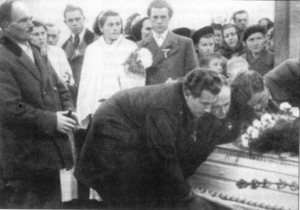 In 2009, on the 70th anniversary of November 17, 1939, OBESSU and ESU promoted a number of initiatives throughout Europe to commemorate the date. An event was held from the 16th to the 18th of November at the University of Brussels, focusing on the history of the students’ movement and its role in promoting active citizenship against authoritarian regimes. The conference gathered around 100 students representing national students and student unions from over 29 European countries, as well as some international delegations. Today, International Students’ Day is a day of remembrance to honor these brave students, who gave their lives and their freedom for a cause the believed in. Some countries, like Czechoslovakia have named it a national holiday.
In 2009, on the 70th anniversary of November 17, 1939, OBESSU and ESU promoted a number of initiatives throughout Europe to commemorate the date. An event was held from the 16th to the 18th of November at the University of Brussels, focusing on the history of the students’ movement and its role in promoting active citizenship against authoritarian regimes. The conference gathered around 100 students representing national students and student unions from over 29 European countries, as well as some international delegations. Today, International Students’ Day is a day of remembrance to honor these brave students, who gave their lives and their freedom for a cause the believed in. Some countries, like Czechoslovakia have named it a national holiday.
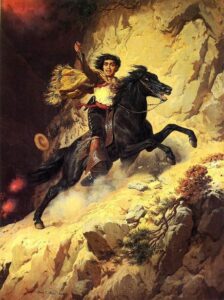
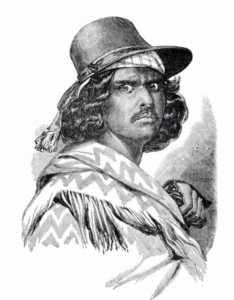 What is the likelihood of a gang of thieves all having the same first name? Probably almost nil, but that is what happened with a gang called The Five Joaquins. The fact that they all had the same first name was the whole reason for the name, obviously. Every gang needs a name, and it must be unique. By having the same name and using that name as the gang’s name, it eliminated any argument over which of the men should be listed first. The Five Joaquins were said to be responsible for the majority of cattle rustling, robberies, and murders that were committed in the Mother Lode area of the Sierra Nevada Range in California between 1850 and 1853.
What is the likelihood of a gang of thieves all having the same first name? Probably almost nil, but that is what happened with a gang called The Five Joaquins. The fact that they all had the same first name was the whole reason for the name, obviously. Every gang needs a name, and it must be unique. By having the same name and using that name as the gang’s name, it eliminated any argument over which of the men should be listed first. The Five Joaquins were said to be responsible for the majority of cattle rustling, robberies, and murders that were committed in the Mother Lode area of the Sierra Nevada Range in California between 1850 and 1853.
While all the men were listed equally, the main “gang boss” was Joaquin Murietta. Other gang members were Joaquin Botellier, Joaquin Carrillo, Joaquin Ocomorenia, and Joaquin Valenzuela. The gang also included was Murietta’s right-hand man, Manuel Garcia, known as “Three-Fingered Jack.” At least he knew who they were talking about when the said his name. I actually find that quite amusing. To have to speak both first and last name when addressing each other, is quite funny. When they first got started, the gang began to terrorize the towns and gold camps because the Mexicans were being discriminated against in the mines and forced off their land by invading hordes of American miners. It was a type of retaliation, but it doesn’t appear that any such thing happened to any of the five or their non-Joaquin cohort. Nevertheless, it is believed that the gang stole more than $100,000 in gold, over 100 horses, as well as killing over 40 people…28 Chinese and 13 Whites. Three of them were lawmen who were killed while the gang was outrunning the posse sent to capture them.
California Governor John Bigler signed a legislative act into law on May 11, 1853, to create the “California State Rangers,” led by Captain Harry Love, who was a former Texas Ranger. I had never heard of the California State Rangers, but with a former Texas Ranger, I can see how they came to be. The “California State Rangers” had the one mission…to capture the “Five Joaquins.” This was a big undertaking and demanded big money. The California Rangers were paid $150 a month and stood a chance to share a $5000 reward for the capture of Joaquin Murrieta. It was great motivation. On July 25, 1853, a group of Rangers encountered a band of armed Mexican men near Panoche Pass in San Benito County, 50 miles from Monterey. A Battle ensued and resulted in the deaths of two of the Mexicans. One was claimed to have been Murrieta, and the other was thought to be Three-Fingered Jack. A plaque near the intersection of State Routes 33 and 198 now marks the approximate 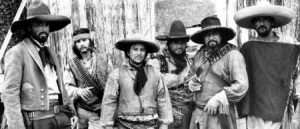 site of Murrieta’s headquarters in Arroyo de Cantua. It is there where he was presumably and officially ruled by the State of California to have been killed. The problem is that the claim was soon disputed and has continued to be. Nevertheless, the result of that skirmish was that the gang broke up, and its activities ended. There were apparently no charges filed, possibly for lack of evidence. Some of the members returned to Sonora, while others remained in California. The killing didn’t stop their criminal activities, however, and they became vaqueros on California ranches, but some went straight, following other walks of life.
site of Murrieta’s headquarters in Arroyo de Cantua. It is there where he was presumably and officially ruled by the State of California to have been killed. The problem is that the claim was soon disputed and has continued to be. Nevertheless, the result of that skirmish was that the gang broke up, and its activities ended. There were apparently no charges filed, possibly for lack of evidence. Some of the members returned to Sonora, while others remained in California. The killing didn’t stop their criminal activities, however, and they became vaqueros on California ranches, but some went straight, following other walks of life.
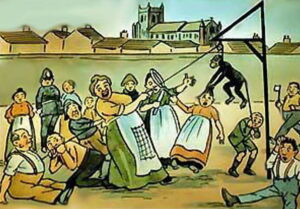 A story is told in Hartlepool, England about an incident during the Napoleonic Wars, of an incident involving a monkey, who came into the custody of the British Army when the ship he was on was wrecked in a storm of the coast of Hartlepool. The sole survivor from the sip was said to be a monkey, who the captain owned, and dressed in the uniform of the ship. That being French, his little uniform was that of the French Army as a form of amusement for the crew. The monkey managed to make it to the shore and was found by a group of locals who apparently also were amused. They decided to hold an impromptu trial, because the monkey was, after all the enemy. Because the monkey was unable to answer their questions, and because they had seen neither a monkey nor a Frenchman before, they concluded that the monkey must be a French spy. With that, they found the monkey guilty and sentenced him to death by hanging, right there on the beach.
A story is told in Hartlepool, England about an incident during the Napoleonic Wars, of an incident involving a monkey, who came into the custody of the British Army when the ship he was on was wrecked in a storm of the coast of Hartlepool. The sole survivor from the sip was said to be a monkey, who the captain owned, and dressed in the uniform of the ship. That being French, his little uniform was that of the French Army as a form of amusement for the crew. The monkey managed to make it to the shore and was found by a group of locals who apparently also were amused. They decided to hold an impromptu trial, because the monkey was, after all the enemy. Because the monkey was unable to answer their questions, and because they had seen neither a monkey nor a Frenchman before, they concluded that the monkey must be a French spy. With that, they found the monkey guilty and sentenced him to death by hanging, right there on the beach.
Apparently, any enemy soldier was to be dealt with in this manner and a trial wasn’t even really necessary. As the story goes, they proceeded with the “hanging” and found it a seriously difficult task, because the monkey kept climbing up the rope to safety. The whole situation, and the local townspeople because the laughingstock of the area, due to their inability to carry out a simple hanging. Everyone in the area got such a kick out of the whole situation, that they made up a song, and even changed the mascot of the local rugby teams to one or the other version of “The Monkey Hangers.” In fact, it was the decision of the local football club, Hartlepool United FC, who capitalized on their “Monkey Hangers” nickname by creating a mascot called “H’Angus the Monkey” in 1999. Two of the town’s six rugby union clubs also use variations of the hanging monkey. Hartlepool Rovers crest being a beret wearing monkey hanging from a gibbet, while Hartlepool RFC neckties sport a rugby ball kicking monkey suspended from a rope. 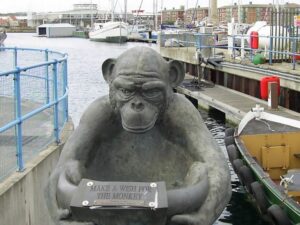
A statue of the monkey has been erected on the Headland and another at Hartlepool Marina (formerly in West Hartlepool). The statues serve to collect coins for a local hospice. Although some Hartlepool residents find the term “monkey hanger” insulting, a large number of residents have embraced the term and celebrate it as an important and unique characteristic of the town. Those offended thought it made them look stupid and incapable of sensible thought. I can understand both trains of thought, because no one wants to look stupid. Still, maybe they should have just embraced it as the joke it was. It doesn’t look like it is going away anyway.
 You’ve heard of con artists selling things like the London Bridge or some ocean front property in Arizona. Well, Victor Lustig was one of the best con artists ever. Lustig was born in Hostinné, Bohemia, Austria-Hungary on January 4, 1890. He was a smart young man, who learned new things easily, but that could be said to have also contributed to his. When a student doesn’t have to spend a lot of time studying, they can become bored and look for entertainment outside of their studies. When Lustig was 19, while taking a break from his studies in Paris, Lustig took to gambling and womanizing, It was during this time he received a defining scar on the left side of his face from the jealous boyfriend of a woman was having an affair with. When he left school, Lustig decided that he could make his best living, using his quick wit and ability to size up of a situation, as well as his fluency in several languages to embark on a life of crime. Like all criminals, the idea of easy money, along with a big helping of excitement, drew Lustig in. He focused on a variety of scams and cons that provided him with property and money, and before long he was a professional con man.
You’ve heard of con artists selling things like the London Bridge or some ocean front property in Arizona. Well, Victor Lustig was one of the best con artists ever. Lustig was born in Hostinné, Bohemia, Austria-Hungary on January 4, 1890. He was a smart young man, who learned new things easily, but that could be said to have also contributed to his. When a student doesn’t have to spend a lot of time studying, they can become bored and look for entertainment outside of their studies. When Lustig was 19, while taking a break from his studies in Paris, Lustig took to gambling and womanizing, It was during this time he received a defining scar on the left side of his face from the jealous boyfriend of a woman was having an affair with. When he left school, Lustig decided that he could make his best living, using his quick wit and ability to size up of a situation, as well as his fluency in several languages to embark on a life of crime. Like all criminals, the idea of easy money, along with a big helping of excitement, drew Lustig in. He focused on a variety of scams and cons that provided him with property and money, and before long he was a professional con man.
Lustig decided that he might like to try traveling along with his scams, and many of his initial cons were committed on ocean liners sailing between the Atlantic ports of France and New York City. He deduced that rich travelers didn’t need their money as badly as he did, so they became a prime target. One of his favorite schemes was one in which he posed as a musical producer who sought investment in a non-existent Broadway production. The scheme worked well in that the victim wouldn’t expect an immediate return on the investment, and by the time they realized that it had been a con, Lustig was long gone. Lustig’s travel schemes came to an end when trips on trans-Atlantic liners were suspended in the wake of World War I, Lustig had to find a new territory in which to run his schemes. So, Lustig opted for a trip to the United States. It seemed like the best option, because he was becoming a little too well known amongst various law enforcement agencies for the scams he committed, including one he conducted in 1922 in which he conned a bank into giving him money for a portion of bonds he was offering for a repossessed property, only to use sleight of hand to escape with both the money and the bonds.
By 1925, Lustig had traveled back to France. While reading the local newspaper in Paris, he came across an article discussing the problems faced with maintaining the Eiffel Tower. Instantly, he knew that he has his next con. At the time, the monument had begun to fall into disrepair, and the city was finding it increasingly expensive to maintain and repaint it. Incredibly, the article speculated that the public opinion might be to simply remove it. It was this part of the article that really inspired Lustig to use the Eiffel Tower as part of his next con. He quickly researched the information he would need to make his scam believable and set to work 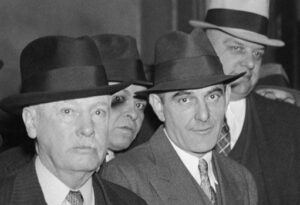 preparing the scam, which included hiring a forger to produce fake government stationery for him.
preparing the scam, which included hiring a forger to produce fake government stationery for him.
The scam was carried out on a small group of scrap metal dealers, who were invited to a confidential meeting at an expensive hotel. Lustig identified himself to them as the Deputy Director-General of the Ministère de Postes et Télégraphes (Ministry of Posts and Telegraphs). During the meeting, Lustig convinced the men that the upkeep of the Eiffel Tower was becoming too much for Paris and that the French government wished to sell it for scrap, but that because such a deal would be controversial and likely spark public outcry, nothing could be disclosed until all the details were thought out. Lustig Told the men that he had been charged with the task of selecting the dealer who would receive ownership of the structure. The men were told that they had “made the final cut” of possible contract winners, because of their reputations as “honest businessmen” and that he was going to make a final selection after the meeting. His speech included genuine insight about the monument’s place in the city and how it did not fit in with the city’s other great monuments like the Gothic cathedrals or the Arc de Triomphe. The men were convinced that Lustig was legitimate.
Because of his long history of reading people, Lustig knew how a perfect mark would look and act, and before long, he had his choice…André Poisson, who was an insecure man who wished to rise up amongst the inner circles of the Parisian business community. As Poisson showed the keenest interest in purchasing the monument, Lustig decided to focus on him once the dealers sent their bids to him. He then arranged a private meeting with Poisson, at which Lustig convinced him that he was a corrupt official, claiming that his government position did not give him a generous salary for the lifestyle he wished to enjoy. Poisson became concerned that he would not win the bid, so he agreed to pay a large bribe to secure ownership of the Eiffel Tower. His lust for the position of “top businessman” would be his downfall. Once Lustig received his bribe and the funds for the monument’s “sale” (around 70,000 francs, which is about $78,757), he soon fled to Austria. Lustig correctly suspected that when Poisson found out he had been conned, he would be too ashamed and embarrassed to inform the French police of what he had been caught up in. Still, he bided his time, checking the newspapers just to be sure. When his suspicions proved correct…when he could find no reference of his con within their pages, he returned to Paris later that year to pull off the same scheme one more time. The second attempt didn’t go over so well. Someone informed the police about the scam and Lustig had no choice but to flee to United States to evade arrest. Lustig is widely regarded as one of the most notorious con artists of his time, and he is infamous for being “the man who sold the Eiffel Tower twice.”

Lustig was finally arrested on May 10, 1935, in New York. He was charged with counterfeiting. He managed to escape from the Federal House of Detention in New York City by faking illness and using a specially made rope to climb out of the building on the day before his trial, but he was recaptured 27 days later in Pittsburgh. Lustig pleaded guilty at his trial and was sentenced to fifteen years in prison on Alcatraz Island, California for his original charge, with a further five years for his prison escape. On March 9, 1947, Lustig contracted pneumonia and died two days later at the Medical Center for Federal Prisoners in Springfield, Missouri. On his death certificate his occupation was listed as apprentice salesman…and I guess he was at that.
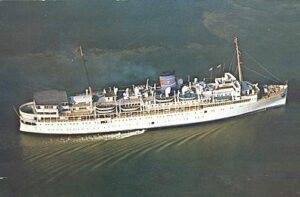 New safety laws usually come about as a direct result of a disaster or some other traumatic event. Such was the case with the laws formed after the fire and subsequent sinking of SS Yarmouth Castle. The ship was originally built as Evangeline, and it was an American steamship. It was the second of two identical ships built by the William Cramp and Sons Ship and Engine Building Company for the Eastern Steamship Lines for service on the New York City to Yarmouth, Nova Scotia route, operating in practice out of Boston as well. As with many ships, Evangeline was pulled into service during World War II and turned over to the War Shipping Administration, which operated all oceangoing vessels for the United States. During its war years, it was used primarily as an army troop transport. On July 1, 1946, after the war was over, Eastern Steamship Lines resumed control of the ship. Following its war service, it was put back in normal service for a short period and then, the ship was laid up. In 1954, it was sold and put under Liberian registry, operating from Boston to Nova Scotia, then to the Caribbean. In 1963 Evangeline was sold again, put under Panamanian registry. Then, it was renamed SS Yarmouth Castle. It was operated by Yarmouth Cruise Lines between Miami and Nassau, Bahamas, from 1964 until the disaster on November 13, 1965.
New safety laws usually come about as a direct result of a disaster or some other traumatic event. Such was the case with the laws formed after the fire and subsequent sinking of SS Yarmouth Castle. The ship was originally built as Evangeline, and it was an American steamship. It was the second of two identical ships built by the William Cramp and Sons Ship and Engine Building Company for the Eastern Steamship Lines for service on the New York City to Yarmouth, Nova Scotia route, operating in practice out of Boston as well. As with many ships, Evangeline was pulled into service during World War II and turned over to the War Shipping Administration, which operated all oceangoing vessels for the United States. During its war years, it was used primarily as an army troop transport. On July 1, 1946, after the war was over, Eastern Steamship Lines resumed control of the ship. Following its war service, it was put back in normal service for a short period and then, the ship was laid up. In 1954, it was sold and put under Liberian registry, operating from Boston to Nova Scotia, then to the Caribbean. In 1963 Evangeline was sold again, put under Panamanian registry. Then, it was renamed SS Yarmouth Castle. It was operated by Yarmouth Cruise Lines between Miami and Nassau, Bahamas, from 1964 until the disaster on November 13, 1965.
On November 12, 1965, Yarmouth Castle departed Miami for Nassau carrying 376 passengers and 176 crew members for a total of 552 people. The ship was due to arrive in Nassau the next day. The captain on the voyage was 35-year-old Byron Voutsinas. Shortly after midnight on November 13, a fire broke out in room 610 on the main deck. Being used as a storage space, the room was filled with mattresses, chairs, and other combustible materials. Unfortunately, the room did not have a sprinkler system, and in the end, the source of the fire could not be determined. It is thought that jury-rigged wiring might have thrown sparks that then entered the room through the ventilation ducts, but simple carelessness was not ruled out either.
A normal patrol went by the room between 12:30am and 12:50am, but they failed to systematically check all areas of the ship and detect the fire. At some point between midnight and 1:00am, the crew and passengers began noticing smoke and heat. Finally, a search was started to find the fire. By the time they discovered it in room 610 and the toilet above that room, it had already begun to spread and attempts to fight the fire with fire extinguishers were useless. Attempts to activate a fire alarm box were also unsuccessful. The bridge was unaware of the fire until about 1:10am, and by that time, Yarmouth Castle was 120 miles east of Miami and 60 miles northwest of Nassau, and in deep trouble. Since the radio room became involved, they were unable to call for help, or even call for the passengers to abandon ship.
The captain proceeded to the lifeboat containing the emergency radio, but he could not reach it. He and several crew members launched another lifeboat and abandoned ship at about 1:45am. The captain later testified that he wanted to reach one of the rescue vessels to make an emergency call. The remaining crew proceeded to alert passengers and attempted to help them escape their cabins. Some passengers tried to escape through cabin windows but couldn’t open them due to improper maintenance. The sprinkler system finally activated but was pretty much ineffective due to the severity of the fire. Crew members attempted to battle the flames with hoses, but they were hampered by low hydrant pressure. The investigation later determined that more valves were open than the pumps could handle.
Some of the lifeboats burned and others could not be launched due to mechanical problems. Only about half of the ship’s boats made it safely away. Passengers near the bow could not reach the lifeboats, but some were later picked up by boats from rescue vessels. The Finnish freighter Finnpulp was just eight miles ahead of Yarmouth Castle, also headed east. That ship’ crew noticed at 1:30am, that Yarmouth Castle had slowed significantly on the radar screen. Looking back, they saw the flames and notified their captain, John Lehto, who had been asleep. Lehto immediately ordered Finnpulp turned around. The Finnpulp successfully contacted the Coast Guard in Miami. It was the first distress call sent out. The passenger liner Bahama Star was following Yarmouth Castle at about twelve miles distance. At 2:15am, Captain Carl Brown noticed rising smoke and a red glow on the water. Realizing that this was Yarmouth Castle, he ordered the ship ahead at full speed. Bahama Star radioed the US Coast Guard at 2:20am.
Though rescue efforts were largely successful, for those who survived, 90 people lost their lives. Yarmouth 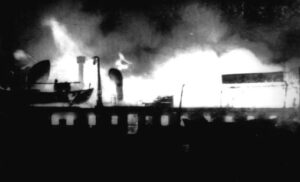 Castle capsized onto her port side just before 6:00am and sank at 6:03am. The wreck has not been located but is thought to rest 10,800 feet below the Atlantic. “The Yarmouth Castle disaster prompted updates to the Safety of Life at Sea law, or SOLAS. The updated law brought new maritime safety rules, requiring fire drills, safety inspections, and structural changes to new ships. Under SOLAS, any vessel carrying more than 50 overnight passengers is required to be built entirely of non-combustible materials such as steel. Yarmouth Castle’s largely wooden superstructure was found to be the main cause of the fire’s rapid spread.”
Castle capsized onto her port side just before 6:00am and sank at 6:03am. The wreck has not been located but is thought to rest 10,800 feet below the Atlantic. “The Yarmouth Castle disaster prompted updates to the Safety of Life at Sea law, or SOLAS. The updated law brought new maritime safety rules, requiring fire drills, safety inspections, and structural changes to new ships. Under SOLAS, any vessel carrying more than 50 overnight passengers is required to be built entirely of non-combustible materials such as steel. Yarmouth Castle’s largely wooden superstructure was found to be the main cause of the fire’s rapid spread.”
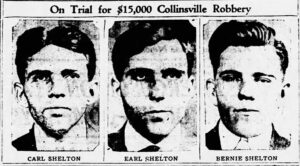 During the Prohibition-era there were many people who opposed the new laws prohibiting the sale and manufacturing of alcohol, in any form. As with any such restriction, there were plenty of people who were willing to take matters into their own hands and make, in this case, illegal liquor. It was a profitable business, and there were a number of people and gangs who wanted in. The Shelton Brothers Gang had a good thing going, when the famous bootlegger, Charles Birger and his gang wanted in.
During the Prohibition-era there were many people who opposed the new laws prohibiting the sale and manufacturing of alcohol, in any form. As with any such restriction, there were plenty of people who were willing to take matters into their own hands and make, in this case, illegal liquor. It was a profitable business, and there were a number of people and gangs who wanted in. The Shelton Brothers Gang had a good thing going, when the famous bootlegger, Charles Birger and his gang wanted in.
The Shelton Brothers Gang had other ideas, however. Both gangs were based out of southern Illinois. The best way to control the market price, is to be the only game in town. With all the fighting for supremacy, the Shelton Brothers Gang would allegedly be known as “America’s Bloodiest Gang” when the fighting quickly became a “Turf War.” The Shelton Brothers Gang was formed by Carl (born 1888), Earl (born 1890), and Bernie “Red” Shelton (born 1898) of “Geff” Jeffersonville, Wayne County, Illinois. They started their gang shortly after Prohibition came into effect in 1920, operating mostly in Williamson County, Illinois, making moonshine and other illegal alcoholic beverages. The operation grew, and they eventually dominated both gambling and liquor distribution in Little Egypt until 1926. That’s when a former ally now turned nemesis, gangster Charles Birger, attempted to take over 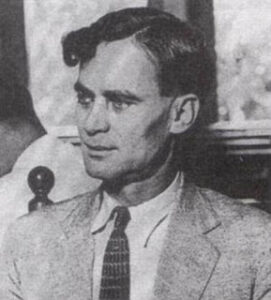 the Sheltons’ bootlegging operations. The result was a violent gang war. The weapons were varied. Both sides use homemade armored trucks and included an eventually included an aerial bombing raid by the Sheltons on Birger’s Shady Rest headquarters. They were out of control, and with the “stepped-up attacks” came what was considered the first bombing from a plane on US soil. Strangely, the “Turf War” was also responsible for keeping the KKK out of their general area after the constant flare ups into fights. The battle was for the control of bootlegging in all of southern Illinois and nothing more.
the Sheltons’ bootlegging operations. The result was a violent gang war. The weapons were varied. Both sides use homemade armored trucks and included an eventually included an aerial bombing raid by the Sheltons on Birger’s Shady Rest headquarters. They were out of control, and with the “stepped-up attacks” came what was considered the first bombing from a plane on US soil. Strangely, the “Turf War” was also responsible for keeping the KKK out of their general area after the constant flare ups into fights. The battle was for the control of bootlegging in all of southern Illinois and nothing more.
The whole thing was brutal in every way, and finally, the Shelton Brothers were set up and blamed for a murder they did not commit. Based on the testimony of Birger and Art Newman, the Shelton Brothers were convicted of an unsolved 1925 mail carrier robbery of $15,000 and sentenced to 25 years in prison, but they were later released. In the meantime, without its leaders, the Shelton Brothers Gang slowly faded, and just as he had planned, Birger dominated bootlegging in Southern Illinois, until he was hanged in 1928 after being convicted of ordering the murder of West City, Illinois, Mayor Joe Adams, who was a Shelton supporter. Eventually, the Shelton Brothers Gang was released for lack of evidence against them. The decided to move the operation to Peoria, Illinois, and focus mainly on gambling. They built an alliance with known gangsters like Al Capone and 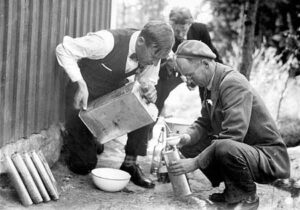 dominated their territory with very few serious rivalries. They did, however, come to the attention of the Federal Officials who eventually placed a $15,000 bounty on each of the Sheltons heads. Carl and Bernie Shelton were both murdered in 1948, on orders from former gang member Frank “Buster” Wortman, who had taken over the Shelton operations while they were in prison. Worman dominated Saint Louis’ illegal gambling and other criminal activities until his death in 1968. Earl Shelton was also ambushed and shot, but he survived. The hits just kept coming, and after a third attempt on his life in the early 1950s, Earl and his family left Illinois for Florida. Earl lived a quiet life there, and in 1986 at age 96, he passed away. He was the last member of the Shelton Brothers Gang.
dominated their territory with very few serious rivalries. They did, however, come to the attention of the Federal Officials who eventually placed a $15,000 bounty on each of the Sheltons heads. Carl and Bernie Shelton were both murdered in 1948, on orders from former gang member Frank “Buster” Wortman, who had taken over the Shelton operations while they were in prison. Worman dominated Saint Louis’ illegal gambling and other criminal activities until his death in 1968. Earl Shelton was also ambushed and shot, but he survived. The hits just kept coming, and after a third attempt on his life in the early 1950s, Earl and his family left Illinois for Florida. Earl lived a quiet life there, and in 1986 at age 96, he passed away. He was the last member of the Shelton Brothers Gang.
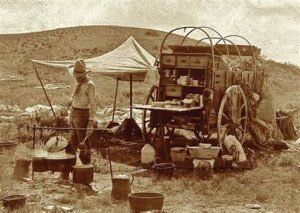 After watching numerous old western shows about cattle drives, most of us would automatically assume that a chuckwagon is a staple on any cattle drive. That is not the case, however. In the early years of cattle drives, the cowboys were supposed to supply their own food, and had to survive on what they could forage and carry. With that in mind, hiring cowboys for the drive was tough. Cowboys were usually paid about $25 to $40 a month, so to have to buy food out of that too, doesn’t make cattle driving a “get rich quick” kind of job. Basically, cattle ranchers ended up with people who couldn’t get a job anywhere else, and they usually weren’t loyal or very good at their job. They might even walk off the job before the drive was over.
After watching numerous old western shows about cattle drives, most of us would automatically assume that a chuckwagon is a staple on any cattle drive. That is not the case, however. In the early years of cattle drives, the cowboys were supposed to supply their own food, and had to survive on what they could forage and carry. With that in mind, hiring cowboys for the drive was tough. Cowboys were usually paid about $25 to $40 a month, so to have to buy food out of that too, doesn’t make cattle driving a “get rich quick” kind of job. Basically, cattle ranchers ended up with people who couldn’t get a job anywhere else, and they usually weren’t loyal or very good at their job. They might even walk off the job before the drive was over.
It was a big problem for ranchers, who needed to have reliable, as well as capable cowboys to work the drives. Finally, one rancher, a man named Charles Goodnight, while pondering the problem he had in getting good working cowboys for his cattle drive. Then, he hit upon an idea. Goodnight created a type of field kitchen covered wagon. It is unknown if the name comes from the fact that the inventor is Charles (Chuck) or if it referenced chuck as a slang term for food. “Goodnight modified a Studebaker-manufactured covered wagon, a d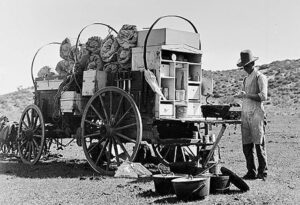 urable Civil War army-surplus wagon, to suit the needs of cowboys driving cattle from Texas to sell in New Mexico. He added a ‘chuck box’ to the back of the wagon, with drawers and shelves for storage space and a hinged lid to provide a flat working surface. A water barrel was also attached to the wagon and canvas was hung underneath to carry firewood. A wagon box was used to store cooking supplies and cowboys’ personal items.” It is said that Goodnight’s main motivation for the chuckwagon, was to be able to hire a better class of cowboy and keep them throughout the cattle drive.
urable Civil War army-surplus wagon, to suit the needs of cowboys driving cattle from Texas to sell in New Mexico. He added a ‘chuck box’ to the back of the wagon, with drawers and shelves for storage space and a hinged lid to provide a flat working surface. A water barrel was also attached to the wagon and canvas was hung underneath to carry firewood. A wagon box was used to store cooking supplies and cowboys’ personal items.” It is said that Goodnight’s main motivation for the chuckwagon, was to be able to hire a better class of cowboy and keep them throughout the cattle drive.
“Chuckwagon food typically included easy-to-preserve items such as baked beans, salted meats, coffee, and sourdough biscuits. Food would also be gathered en route. There was no fresh fruit, vegetables, or eggs available, and meat was not fresh unless an animal was injured during the run and therefore had to be killed. The meat they ate was greasy cloth-wrapped bacon, salt pork, and beef, usually dried, salted or smoked. On cattle drives, it was common for the “cookie” who ran the wagon to be second in authority only to the “trailboss.” The cookie would often act as cook, barber, dentist, and banker.” A typical trail boss made $100 to $125 a month, and the cook usually made about $60. 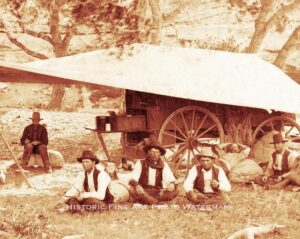 The cook was vital to the cattle drive and was not to be crossed. The men were to keep their distance from the chuckwagon, because dust would get in the food. The horses left camp downwind of the chuckwagon for the same reason. No one dared take the last serving of food until they were sure that everyone had been served. To leave food on their plates was an insult to the cook. The cooks had long days…up before dawn to prepare food. After the men left for work, they cleaned up camp and washed dishes, then went to the next camp site to begin dinner for the men’s arrival. After dinner they cleaned up and went to bed. The next day would soon arrive. They more than earned their wage and the special wagon they got to use.
The cook was vital to the cattle drive and was not to be crossed. The men were to keep their distance from the chuckwagon, because dust would get in the food. The horses left camp downwind of the chuckwagon for the same reason. No one dared take the last serving of food until they were sure that everyone had been served. To leave food on their plates was an insult to the cook. The cooks had long days…up before dawn to prepare food. After the men left for work, they cleaned up camp and washed dishes, then went to the next camp site to begin dinner for the men’s arrival. After dinner they cleaned up and went to bed. The next day would soon arrive. They more than earned their wage and the special wagon they got to use.

